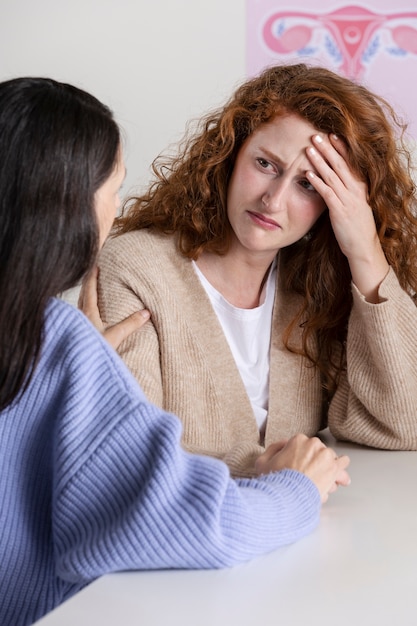
Perimenopause, the phase leading up to menopause, can begin as early as 15 years before menopause itself. Dr. Deyo Famuboni, a London GP, explains ten common symptoms to watch out for during World Perimenopause Day.
You might have been enjoying a stable routine with your menstrual cycle for the past several years when you suddenly notice your period is late. First thought: “Am I pregnant?” You take a test and it’s negative, and your period eventually arrives. So, what’s happening?
This scenario could indicate perimenopause, the natural transition period before menopause when a woman’s body moves towards permanent infertility. The average age for menopause in the UK is around 52, but perimenopause can start in the early forties, sometimes even in the mid-thirties, due to fluctuating hormone levels, mainly estrogen.
Although perimenopause can be concerning, lifestyle changes like regular exercise and a diet rich in phytoestrogens (found in soybeans, dark leafy greens, and vegetables like broccoli) can help manage symptoms. However, if your quality of life is significantly affected, consult your doctor as further tests and treatments, such as hormone replacement therapy, may be necessary.
Hormone changes can make your period irregular—shorter, longer, or absent for a couple of months. Heavy periods or no periods for over three months warrant a doctor’s review, especially if you’re under 40.
Hot flashes and night sweats, caused by hormonal fluctuations, are common and can last from 2 to 15 years. Wearing breathable clothing and staying hydrated might help. Avoiding triggers like being overweight, caffeine, alcohol, spicy foods, and certain medications can also make a difference.
Mood swings, irritability, and anxiety are other signs of perimenopause, often worsened by poor sleep. Regular exercise and a balanced diet can stabilize blood sugar levels and improve mood.
Vaginal dryness and discomfort, which can occur during sex, result from decreased lubrication and elasticity. Using vaginal lubricants can alleviate this issue.
Women may experience more frequent urinary infections during perimenopause due to anatomical changes. Increased urgency and discomfort during urination should be checked by a healthcare professional, and pelvic floor exercises may help maintain bladder control.
Libido changes, caused by hormonal shifts, can affect many women, though some experience no problems. Fertility declines as ovulation decreases, so seek medical advice if you’re having trouble conceiving in your late 30s or early 40s and don’t intend to fall pregnant; use contraception for 12 months after your last period.
As estrogen levels drop, so does bone density, increasing the risk of osteoporosis. Keeping up with calcium and vitamin D intake and regular exercise for bone strength can help. Glucosamine may relieve joint pain for some, although scientific support is limited.
Weight gain, particularly around the middle, can occur due to slower metabolism, stress, and declining muscle mass. Regular exercise and a nutrient-rich diet can help manage weight. If you experience sudden weight gain, see your doctor.
Lower estrogen levels can increase cholesterol and blood sugar levels, stiffening the heart and blood vessels, leading to heart disease risks. Seek urgent medical attention for any chest discomfort, particularly on the left side.
Dr. Deyo Famuboni, a London GP with over a decade of experience, shares her insights on perimenopause. She has extensive training in various medical fields, and she actively promotes health and nutrition through her blog and Instagram.

